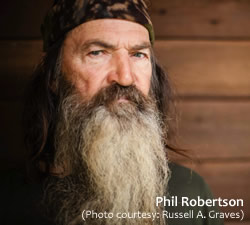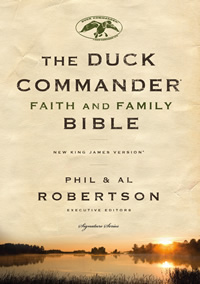Al Robertson (pictured right) and his dad, “Duck Commander” Phil, are no strangers to sharing their faith. Their ubiquitous television show has provided them a vehicle to influence the lives of millions. They are continuing to take every opportunity to leverage that platform to reach people with the gospel. CCM talked with Al about controversy, criticism and a new project that just might be the most significant they will ever undertake.
CCM: You and your dad have encountered quite a bit of controversy and backlash for your outspokenness about the Bible and your beliefs. How do you view the criticism? And is it worth it?
AL: Oh, absolutely. The way we see it — when you’re nationally known, especially — you’re going to get criticism from all sides. Some will be from your own community, the Christian community; and some will be from outside, people who feel stepped on because of things you may say or do, especially biblically. But here’s how we view it: When Paul said, “Those who live a godly life in Christ Jesus will be persecuted,” he meant it. If you’re going to impact people, you’re going to undergo some difficulty. Certainly everybody in the New Testament did, our Lord and Savior the most. So look, if those guys did what they did, or if you read Hebrews 11 and you see what some of the people have gone through in the course of history, what we get in the form of some criticism or some anger here and there, to us is pretty minor in terms of what other people have had to endure, and are enduring to this day because of their faith and beliefs. It’s absolutely been worth it. In fact, it’s expected. To me, if you’re not getting any sort of criticism or difficulty, then you probably aren’t impacting a lot of people. So we’ve embraced that. We realize that goes with the territory. If you’re going to put yourself out there — especially for your beliefs — you need to be ready because the evil one doesn’t give up easily.
CCM: Speaking of impacting people, you recently had the supreme opportunity to effect life change — both broad and deep — through the development of a special devotional/study Bible. What led to that? How did the whole project evolve?
 AL: Well, Dad has been a student of the Word for forty years, and I myself have been for twenty-plus years. I’ve spent so much time in it, not only being impacted by it personally but also figuring out how to impart it to other people. It’s obviously been the guiding influence in our lives; so when HarperCollins and Thomas Nelson approached us with this idea of doing something like this, man, I jumped on it. I was like, “This would be awesome.” As much as we’ve enjoyed writing books and getting our story out there, to be associated with these stories is like the ultimate, so [Dad and I] were excited about it. I said, “Look, let’s just use some of our teaching and some of the things we’ve done throughout the years and just sort of roll that up into one huge Bible study.”
AL: Well, Dad has been a student of the Word for forty years, and I myself have been for twenty-plus years. I’ve spent so much time in it, not only being impacted by it personally but also figuring out how to impart it to other people. It’s obviously been the guiding influence in our lives; so when HarperCollins and Thomas Nelson approached us with this idea of doing something like this, man, I jumped on it. I was like, “This would be awesome.” As much as we’ve enjoyed writing books and getting our story out there, to be associated with these stories is like the ultimate, so [Dad and I] were excited about it. I said, “Look, let’s just use some of our teaching and some of the things we’ve done throughout the years and just sort of roll that up into one huge Bible study.”
We sat down with the guys [from Thomas Nelson], making sure our stories flowed and made sense. It was so much fun because we had [basically] a week-long Bible study. Every day we were getting into the Word, and we all had our Bibles out, and of course they had their computers and laptops and everything, and Dad and I were more just kind of the straight Bible. But we had a blast. It was a lot of fun.
CCM: One feature that distinguishes this Bible from others is the section of firsthand accounts of life change. How did you select the stories? How did they become a part of the whole thing?
AL: It’s interesting because, starting out, as we were telling about different teaching aspects and Bible verses, we kept telling these stories of impact and life change. As we worked on the content, it sort of took on a life of its own. The guys from Thomas Nelson were saying, “You know, this life-change stuff alone — it’s almost as if it needs to have its own section.” So that led to the idea of putting those at the front of the Bible, sort of as a devotional guide — maybe a month-long devotional — to get into it before you really start attacking the entire Word of God. We’ve impacted a lot of people through the years — some amazing life-change stories. So we had to decide which ones and narrow it down to thirty people, and we put those at the front because really we feel like that’s the whole purpose of the Bible. It’s just a great love story between God and His creation, and it’s this great story of what lengths He went to in order to connect us back to Him after sin entered the world. So what better way to start it off than to show some examples of some of the life changes we’ve seen?
We’ve talked a lot about our own life changes in other books, but these are the stories of people we’ve impacted through forty years of ministry. For me, it sets the tone for what the entire Bible is about. People approach the Bible and see it sometimes as this big, scary book; and they wonder, “Well, how does this relate to me today?” But really and truly, it is a practical story, spread out over many, many years, of what God has done and the lengths He went to in order to provide Christ. So it’s not intimidating to me at all. In fact it’s refreshing because you never get tired of talking about it. So whether you’re looking at a verse or a few chapters, every time you approach it you see something a little different that you didn’t see before. That’s what I loved about teaching and preaching all those years.
CCM: In this particular project, did that happen to you? Did a specific book or story in the Bible strike you differently this time around?
AL: Oh, yeah, no doubt. When we were looking in Ephesians 3, “He can provide more than we can ask or imagine” — that idea — but as I related that this time through — just seeing what God had done in our family in terms of being this nationally-known group of people and going and speaking to thousands of people, and seeing — instantly sometimes — that God can change lives through your message and through what you’re putting out there, and even just through a prayer on a television show — that verse spoke to me on a whole new level. I thought, “Who could have ever imagined this?”
That seems to so much apply now to everything we’re doing — it almost seems surreal. I never viewed that verse that way before, but that’s what happens: you get to these different places in your life, and all of a sudden it speaks to you in a different way.
CCM: Are there any particular characters within the Bible stories that you relate to more specifically than others?
 AL: I’ll give you my Old Testament and New Testament guys. My Old Testament guy is Joseph. I’ve always connected to him because he had this gift or ability as a young person, and he wasn’t quite sure what to do with it. The whole part of the development of his life from the time he was 17 until he was 30 was really understanding that he had to trust in God more than himself, that he would be facing this big moment he didn’t know he was going to be facing. Because really, to me, it all leads up to when he had his brothers there and he says, “Do I forgive them? Or do I make them pay and get revenge for what they did to me?” I’ve always connected to that and understood that and why he desired to be pure and to love God. So, I understand him in some ways. I love the story of Joseph.
AL: I’ll give you my Old Testament and New Testament guys. My Old Testament guy is Joseph. I’ve always connected to him because he had this gift or ability as a young person, and he wasn’t quite sure what to do with it. The whole part of the development of his life from the time he was 17 until he was 30 was really understanding that he had to trust in God more than himself, that he would be facing this big moment he didn’t know he was going to be facing. Because really, to me, it all leads up to when he had his brothers there and he says, “Do I forgive them? Or do I make them pay and get revenge for what they did to me?” I’ve always connected to that and understood that and why he desired to be pure and to love God. So, I understand him in some ways. I love the story of Joseph.
In the New Testament, it has to be Peter because Peter was a commercial fisherman. We did that for many years while we were building our duck call business. Peter was hot and cold. At times he seemed to be on fire and say the right things; at other times he’d stick his foot in his mouth — which I get because I’ve certainly done that a few times myself—and then ultimately he blew it. But Christ’s love is big enough that when he had that opportunity to come back, he did; and then he did great things in the Book of Acts. So I think that’s the guy I and my family can relate to [most] in the New Testament. There are some great similarities there.
CCM: Of all the many Bible translations available, you went with the New King James Version for this Bible. Why that particular translation?
AL: That’s a great question because we’ve always been NIV people basically from when Dad became a Christian. When we memorized verses, it was in the NIV. So, we talked about using that for this project because it was what we were familiar with, but I asked the guys, “Tell me, what version do more people look at?” So of course we talked about the King James. But the Victorian language is kind of hard to relate to for the common person. They told me the New King James Version was a very popular version because it connects with the King James Version group of people, and it’s not one that some people will embrace and read and other people won’t. I said, “Look, the Bible’s the Bible. I’ve spent twenty-two years studying it. I’ve used many different versions in my study.” I like the New King James even though I don’t have a lot of memorization in it, so I said, “Let’s just do that one. That one will appeal to the most people and have an opportunity to get into the most hands.” So that’s what we did. And I’ve enjoyed it. Every version has a little different way of expression…different words are used. That’s why I like to use a lot of different versions when I study because it gives me a broader scope of words and language and how to relate that.
CCM: Do you harbor any special hopes for the Duck Commander Faith and Family Bible?
AL: Of course, I hope Christians will pick it up and spend some time in the Word. But I’m also hoping that maybe this will be the first Bible for some folks — maybe people who have seen us on television, who aren’t Christians or maybe just became Christians— who might say, “You know, we like those guys, so we’re going to pick up a copy and see what this is all about.” I’m excited about that potential.
CCM: It seems as if every time I get online there’s something new you all are doing. Is there an end in sight? What’s the trajectory like? What do you hope to see happen for yourself in the next three to five years?
AL: I think from a family perspective, we’re just holding on and seeing where God takes us. My dad and mom and Si are all in their late 60s, and they’re getting to the point where I think they want to just do some projects they want to do for themselves, maybe not be going quite as full bore as the rest of us. But all the rest of us are in our 40s, and Jep’s in his 30s, so who knows where we go from here? We don’t have that part laid out until the show ends, and all shows have popularity and arcs; at some point they quit being on the air, so we know that’s coming. Then we’ll just see. We said all along, “If God wants us to be doing this and impacting people on a large scale, we’ll do that. If He decides that we need to go back to impacting people in Monroe and West Monroe, we’ll do that. And we’ll just realize it’s His plan for us, whether it’s a long season or a short season.”
YOU CAN PURCHASE THE DUCK COMMANDER FAITH AND FAMILY BIBLE HERE

 Listen Live
Listen Live
Leave a Reply
You must be logged in to post a comment.